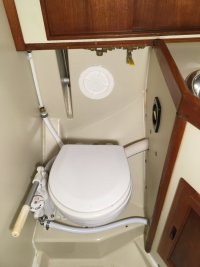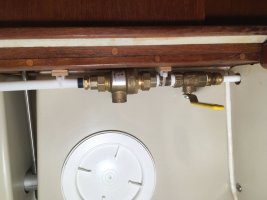peaman
Sustaining Member
It seems to be common knowledge that using fresh water for flushing the head is the best protection against foul odors leaching through plumbing hoses. A few different arrangements have been used for accomplishing that in boats like ours, including:
1.) Replace the traditional head with one designed for using pressurized fresh water
2.) Installing valve(s) in basin drain and flush-water lines so basin water can be used for flushing
3.) Using combination basin faucet/shower head for directly irrigating the bowl with fresh water
Each of these have their trade-offs of economy, convenience, elegance, and simplicity.

Fresh water flushing is provided by the yellow valve handle at upper right in the image, just below the cabinetry. The fresh water is delivered to the bowl through a tee into the sea water flush hose at the rear of the head.

The installation includes a quarter-turn ball valve (the yellow handle), which passes pressurized fresh water through a specialized anti-backflow valve for flushing. The special valve includes double check valves, separated by an air gap, specifically, Watts 9D-M3.
Operation is very simple. The sea water sea cock may remain open, whether sea water or fresh water is to be used for flushing. If sea water is to be used, then the usual procedure of opening the "wet flush" valve on the hand pump applies. Otherwise, if fresh water is to be used, open the fresh water valve for a short period to introduce fresh water into the bowl, through the rim, and then hand pump the bowl to empty. Guests need never know about the "wet flush" valve on the hand pump, so less user instruction is needed.
In my installation, I used 3/8" white PEX tubing with SharkBite Push-to-Connect fittings to tap into to the pressure fresh water system enclosed within the vanity. After the Watts double check valve, I used 1/2" white PEX with SharkBite copper ring crimp fittings for a clean aesthetic.
1.) Replace the traditional head with one designed for using pressurized fresh water
2.) Installing valve(s) in basin drain and flush-water lines so basin water can be used for flushing
3.) Using combination basin faucet/shower head for directly irrigating the bowl with fresh water
Each of these have their trade-offs of economy, convenience, elegance, and simplicity.

Fresh water flushing is provided by the yellow valve handle at upper right in the image, just below the cabinetry. The fresh water is delivered to the bowl through a tee into the sea water flush hose at the rear of the head.

The installation includes a quarter-turn ball valve (the yellow handle), which passes pressurized fresh water through a specialized anti-backflow valve for flushing. The special valve includes double check valves, separated by an air gap, specifically, Watts 9D-M3.
Operation is very simple. The sea water sea cock may remain open, whether sea water or fresh water is to be used for flushing. If sea water is to be used, then the usual procedure of opening the "wet flush" valve on the hand pump applies. Otherwise, if fresh water is to be used, open the fresh water valve for a short period to introduce fresh water into the bowl, through the rim, and then hand pump the bowl to empty. Guests need never know about the "wet flush" valve on the hand pump, so less user instruction is needed.
In my installation, I used 3/8" white PEX tubing with SharkBite Push-to-Connect fittings to tap into to the pressure fresh water system enclosed within the vanity. After the Watts double check valve, I used 1/2" white PEX with SharkBite copper ring crimp fittings for a clean aesthetic.

